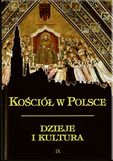OD CUM ADOLESCENTIUM AETAS (15 VII 1563 R.) DO PASTORES DABO VOBIS (25 III 1992 R.). EWOLUCJA USTAWODAWSTWA KOŚCIELNEGO O FORMACJI SEMINARYJNEJ
From Cum adolescentium aetas (July 15, 1563) to Pastores dabo vobis (March 25, 1992). The Evolution of Church Legislation on Seminary Formation
Author(s): Łukasz KruckiSubject(s): History
Published by: Katolicki Uniwersytet Lubelski Jana Pawła II - Wydział Teologii
Keywords: papal teaching; seminary; priesthood; preparation
Summary/Abstract: The 23rd session of the Tridentine Council passed the reformation decree Cum adolescentium aetas (1563). It ordered bishops to create diocesan priestly formation seminaries. These were to be theological institutions forming future priests. Thus, it was also ordered that such candidates who through their attitude and abilities would hold promise in becoming good spiritual clergymen be accepted. Additionally, it was advised that they be formed in the area of philosophy and theology so as to develop within them a spirit of piety. These goals were to enable future priests to lead Catholic missions despite the widespread reformation trends, latter becoming rational and liberal as well. The significance of the council’s decree was appreciated by subsequent popes, particularly in the last two centuries. They composed the law rooted in the Tridentine Council’s ruling, and at the same time responded to the demands placed by the specific age. This was demonstrated particularly during the pontificate of Pius IX, as well as later during the debates of the Second Vatican Council, which worked out a special decree on priestly formation, Optatam totius. John Paul II most clearly spoke for its need when on March 25, 1992, he announced the apostolic exhortation Pastores dabo Vobis. It included guidelines for priestly formation in contemporary times, at the same time describing four elements: the human, spiritual, intellectual and pastoral, which, when appropriately deepened, would lead to an improvement in the life and work of the clergy.
Journal: Kościół w Polsce. Dzieje i kultura
- Issue Year: 2012
- Issue No: 11
- Page Range: 57-69
- Page Count: 13
- Language: Polish

